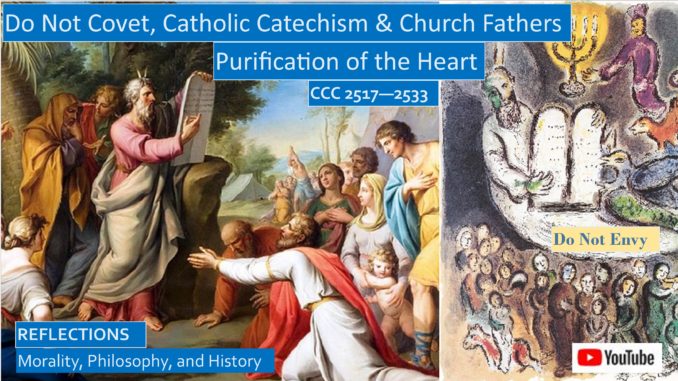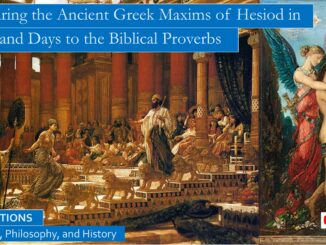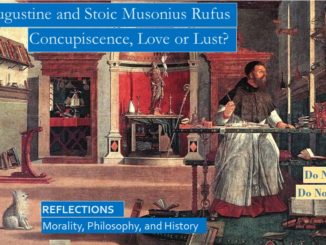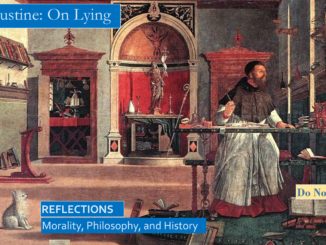
The Catholic Catechism teaches that “the heart is the seat of moral personality.” Matthew’s Beatitudes exhort, “Blessed are the pure in heart, for they will see God.”[1] The Catechism teaches us that the “pure in heart are those who have attuned their intellects and wills to the demands of God’s holiness” in charity, chastity, and love of truth.[2]
Here the Catechism has a reference to the Shepherd of Hermas, a well-regarded work that many early Christians regarded as Scripture. The Shepherd of Hermas instructs us how to cultivate the purity in our hearts by avoiding covetousness:
“Be simple and guileless, be like the children who are ignorant of the wickedness that ruins the life of men. Speak evil of no-one, and do not revel to anyone who speaks evil of another.” You sin when you listen to slander, when you believe the slander you become a slanderer. “Slander is evil and an unsteady demon, never peaceful, always stirring up discord.” “Practice goodness,” “give to all,” “he who gives is guiltless.”
YouTube video for this blog: https://youtu.be/v_BmOU1VcHQ
Please read our other blogs on the Catholic Catechism on DO NOT ENVY:
Catholic Catechism, Do Not Covet, CCC 2514-2516: https://wp.me/pachSU-e1
Catholic Catechism, Thou Shalt Not Covet thy Neighbors Possessions, CCC 2534-2540, https://wp.me/pachSU-eq
Catholic Catechism, Thou Shalt Not Covet thy Neighbors Possessions, CCC 2541-2557, https://wp.me/pachSU-fx
Please view our YouTube Videos on DO NOT ENVY your neighbor’s wife: https://youtu.be/vhte2s1ITNU and https://youtu.be/v_BmOU1VcHQ
Please view our YouTube Video on DO NOT ENVY your neighbor’s possessions: https://youtu.be/8QHrtKGDzKM
CATHOLIC CATECHISM, DO NOT COVET, SECTIONS 2517-2527[3]
Read the Catholic Catechism For Free on US Bishops website
http://www.usccb.org/beliefs-and-teachings/what-we-believe/catechism/catechism-of-the-catholic-church/
The translation used by the Catechism renders the first sentence in the Shepherd of Hermas as, “Remain simple and innocent, and you will be like little children who do not know the evil that destroys man’s life.” The command that we should be guileless infers that this simplicity requires effort and vigilance, while the command to be innocent like children reminds of the words of Jesus, “Truly I tell you, unless you change and become like children, you will never enter the kingdom of heaven. Whoever becomes humble like this child is the greatest in the kingdom of heaven.”[4]
See our blog on the Shepherd of Hermas.
The Shepherd of Hermas teaches us that “we are to guard ourselves from wild and wicked desires which are difficult to tame.” Foremost among the desires we should contain “is the desire after another’s wife or husband, and after extravagance, and many useless dainties and drinks, and many other foolish luxuries; for all luxury is foolish and empty.” Instead, “put on the desire of righteousness, arming yourself with the Fear of the Lord, resisting evil desires.” The temptations of a life of luxury leads to covetousness, which leads to all the other sins against our neighbor.
The Shepherd of Hermas also urges us to a life of chastity and loyalty to our spouses, and offers valuable advice to the jilted partner of the wayward spouse which is very relevant to Christians in any age.[5]
The Catholic Catechism teaches us that “there is a connection between purity of heart, of body, and of faith,” and quotes from St Augustine’s concluding paragraph in his commentary on the Apostle’s Creed, “The faithful must believe the articles of the Creed ‘so that by believing they may obey God, by obeying may live well, and by living well may purify their hearts, and with pure hearts may understand what they believe.’ “
See our blog on St Augustine, On Faith and the Creed
When we truly believe in our heart the Creed we will cheerfully obey God, we will then live well and purify our hearts, and with pure hearts we can truly understand the meaning of the creed. Before this can happen we need to know what the Creed says, and studying what the Church Fathers and the Catechism teaches us about the Creed can only help. Language and knowledge is what distinguishes us from the beasts and permits us to acquire wisdom. Why are we such eager Sunday afternoon quarterbacks, second-guessing coaches, when we let our minds drift during the sermon, if we attend church at all? If we truly Love the Lord, why would we not be eager to learn how to please the Lord?
St Augustine in his treatise on the Creed teaches us that when we truly understand the nature of the Trinity, when we truly realize how unconditionally God loves us, when we comprehend that God is Love, then we will naturally be led to Love God with all of our heart and with all of our soul and with all of our mind, and love our neighbor as ourselves. We can never envy the good fortunes of those neighbors whom we love.[6]
The Catechism teaches us that purity in heart prevents us from covetousness by enabling us to see others as God sees them, enabling us to see others as our neighbors, enabling us to realize we are all “temples of the Holy Spirit, a manifestation of heavenly beauty.”
“Baptism confers on its recipient the grace of purification from all sins.” But grace is not a deliverance from our struggle against our sins and passions, we must struggle by virtue and chastity, by purity of intention and good motives, seeking to please God, by purity of vision, guarding our eyes, the gateways to our souls, and by prayer. The Catechism quotes the Confessions of St Augustine, “no-one can be continent unless You grant it. For you would surely have granted chastity if my inner groaning had reached your ears and I with firm faith had cast my cares on you.” St Augustine may be referring to his prior prayer, before he fully converted to a godly life, “God, grant me continence, but not yet!” How patiently God waits for sinners to repent.
See our upcoming blog series on St Augustine’s Confessions
The following sections on coveting have no footnotes, these sections carry advice from the bishops to the flock on modern issues we encounter when we try follow this commandment in our daily lives. We encourage you to read these sections of the Catechism for yourself, we will only briefly summarize them.
A modern teaching of Vatican II is we should respect the dignity of all people, and in particular we should respect the personal dignity of those close to us, our family, our friends, our co-workers. We respect the dignity of others when we see them as real persons, when we respect them as human beings, when we do not treat them as objects to use for our own personal pleasure and profit.
We should be modest in our dress, in our discretion, in our feelings, we should not seek to arouse passions and temptations in others that will cloud their ability to respect our dignity as a person, and will instead tempt others to see us as mere objects to be used. Modesty respects God, modesty respects our neighbor, modesty keeps our hearts pure. Standards of modesty do vary by culture, but when in doubt, expose less, speak less, criticize less.
We should be modest in our speech, and we should be modest in what we see. What we say matters. What we see matters. Just as much as we should guard what we say, avoiding cursing and vulgarity, avoiding gossip, so we should avoid polluting our memories and our souls with evil memories from sadistically violent or voyeuristic or pornographic movies.
Our modesty should serve as a good example for our children, so we are able to teach modesty to our children. We must teach our children to respect the truth, to treasure purity of heart, to seek “the moral and spiritual dignity” of all those around them.[7]
The Catechism closes this discussion with a quote from section 58, Gaudium Et Spes, the Pastoral Constitution of the Church in the Modern World: “The Good News of Christ continually renews the life and culture of fallen man; it combats and removes the error and evil which flow from the ever-present attraction of sin. It never ceases to purify and elevate the morality of peoples. It takes the spiritual qualities and endowments of every age and nation, and with supernatural riches it causes them to blossom, as it were, from within; it fortifies, completes, and restores them in Christ.”[8]
Gaudium Et Spes is one of the main documents issued by Vatican II. Since it explores the relationship between the Church and modern world, it was debated and amended and rewritten many times in many sessions. The quote is from the section exploring how the Church should respond to the modern culture, and it really restates the classical struggle between the Church and the world, Who is going to influence whom? Will the world corrupt the Church, dragging it down, condemning it; or will the Church purify the world, uplifting mankind, making the world a better place?[9]
Will we permit the world to corrupt us, drag us down into the abyss? Or we will we bring out our life from under our bushel, so everyone we meet will be slightly better people because we were in their lives?
Another question generated by these catechetical reflections is this:
Did God create us as intelligent men in His image so we could spend all our free time entertaining ourselves?
This was not a problem in the ancient world, there was no television, no radio, no movies, no internet in the ancient world. Where there was theater, it was infrequent, Dr Wikipedia suggests that ancient Athens had about dozen religious festivals each year where theatrical contests were held. Many of the ancient discourses of the Church Fathers were talks or sermons that could last for hours, and we know the congregation paid rapt attention because St Augustine admonished his parishioners not to applaud.
But today we itch to get home and watch the television. We should ask ourselves, Does God want us to spend all our time watching all the movies and series that come out? Or should we spend some time studying Scriptures and the Church Father and the Catechism?
We are not forbidden to relax on the weekends after a hard week at work, especially when the latest Star Wars or Avatar movie debuts, but if we do go to the movies should we ask ourselves, Will watching this movie make us slightly better people? It is indeed possible to watch really good, thoughtful movies that are also entertaining. One suggestion is to invest in some classic movie review books by the late Robert Ebert. You can spend many weekends watching classical movies that teach valuable moral lessons, and are quite captivating.
The Catholic Catechism summarizes the teachings on coveting and concupiscence:
2528 “Everyone who looks at a woman lustfully has already committed adultery with her in his heart” (⇒ Mt 5:28).
2529 The ninth commandment warns against lust or carnal concupiscence.
2530 The struggle against carnal lust involves purifying the heart and practicing temperance.
2531 Purity of heart will enable us to see God: it enables us even now to see things according to God.
2532 Purification of the heart demands prayer, the practice of chastity, purity of intention and of vision.
2533 Purity of heart requires the modesty which is patience, decency, and discretion. Modesty protects the intimate center of the person.[10]
[1] https://www.biblegateway.com/passage/?search=matthew+5%3A8&version=NRSVCE
[2] Catechism of the Catholic Church, 2nd Edition (Washington DC: US Catholic Conference: 1994), pp. 602-603, sections 2517-2518.
[3] http://ccc.usccb.org/flipbooks/catechism/index.html#602
[4] https://www.biblegateway.com/passage/?search=matthew+18%3A3-4&version=NRSVCE
[5] “The Pastor of Hermas”, In the Ante-Nicene Fathers, Volume 2, translated by Rev F Crombie (Boston: Hendrickson Publishers, 1994, first published 1885), Book 1, pp. 20-29.
[6] St Augustine, “On Faith and the Creed,” In the Nicene and Post-Nicene Fathers, Volume 3, translated by Rev SDF Salmon (Boston: Hendrickson Publishers, 1994, first published 1887), Book 1, pp. 328-331.
[7] Catechism of the Catholic Church, 2nd Edition (Washington DC: US Catholic Conference: 1994), pp. 602-603, sections 2517-2527.
[8] http://www.vatican.va/archive/hist_councils/ii_vatican_council/documents/vat-ii_cons_19651207_gaudium-et-spes_en.html
[9] Edward Hannenberg, “Concise Guide to the Documents of Vatican II (Cincinnati: St Anthony Messenger Press, 2007) pp. 56, 65-66.




2 Trackbacks / Pingbacks